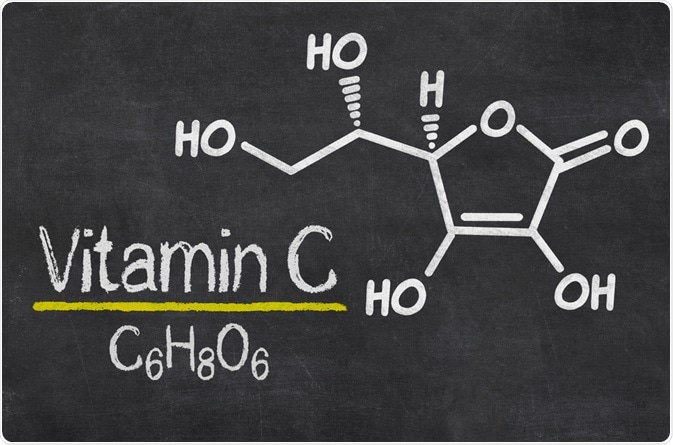Vitamin C, or ascorbic acid, is an essential requirement for various physiological processes because of its reducing activity.

Image Credit: Zerbor / Shutterstock.com
Protein synthesis
Vitamin C is vital for the normal synthesis of collagen, L-carnitine, catecholamines, and proteins. This essential vitamin acts as a cofactor to the mixed-function oxidase enzymes that catalyze these chemical pathways. The reaction centers of these enzymes contain bound metals, which remain in their reduced form by vitamin C, thus allowing them to sustain their enzymatic activity.
Vitamin C catalyzes the post-translational hydroxylation of proline and lysine residues that are incorporated into various proteins found in supporting tissues such as collagen, osteoid, and intercellular cement. Hydroxylation of these residues imparts tensile strength by allowing fibers to cross-link within the protein.
Collagen, which is a fundamental component of connective tissues, is one of the important proteins whose formation is catalyzed by vitamin C. Vitamin C is thus vital to body growth and wound repair.
Vitamin C donates electrons readily to eight enzymes in the human body. Three of these are involved in the biosynthesis of collagen.
Antioxidant activity
In addition to its contribution to the synthesis of proteins, an equally important role of vitamin C is its antioxidant role. Vitamin C is a powerful reducing agent and therefore readily takes part in redox reactions, shifting between the two forms ascorbic acid and dehydroascorbic acid. Additionally, this vitamin is responsible for the non-enzymatic regeneration of other antioxidant molecules, which take part in various physiological processes, such as alpha-tocopherol (vitamin E). Vitamin C is also known for its ability to protect glutathione from oxidation.
Thus, vitamin C is the primary water-soluble antioxidant in the body. It protects cell membranes, DNA, cell proteins, and lipids from the oxidizing effects of free radicals and reactive oxygen species (ROS). These are not only byproducts of normal cellular metabolism, but are also overproduced during immune activation or inflammation in response to exposure to biological or chemical toxins or pollutants.
Immune regulation
A third function of vitamin C is its role in immune regulation. Vitamin C stimulates phagocytosis, as well as antibody formation.
Iron absorption
Vitamin C enhances the absorption of non-heme iron, which is the type present in plant foods, in the intestine. It does this by reducing ferric iron to the ferrous state, which is better absorbed.
Bile acid synthesis
Vitamin C stimulates the initial step in cholesterol metabolism to bile acids via the 7-alpha-hydroxylase enzyme. This function may have importance in the formation of gallstones and the maintenance of normal blood cholesterol levels.
Serotonin production
Vitamin C is also essential for the synthesis of serotonin, during which it hydroxylates the amine tryptophan to 5-hydroxy tryptophan.
Reducing activity in other situations
Vitamin C reduces methemoglobin back to hemoglobin and also maintains folic acid in its reduced form of tetrahydrofolic acid. Tetrahydrofolic acid is essential for red cell maturation, as it acts as a cofactor for the enzyme folate reductase.
Adrenal steroid synthesis
Vitamin C is present in relatively high concentrations in the adrenal cortex; howeer, the levels go down after adenocorticotropic hormone (ACTH) stimulation of the gland. This implies that vitamin C has a part to play in the synthesis of adrenal steroids.
References
Further Reading
Last Updated: Mar 23, 2021